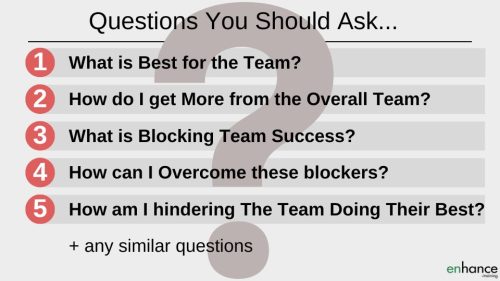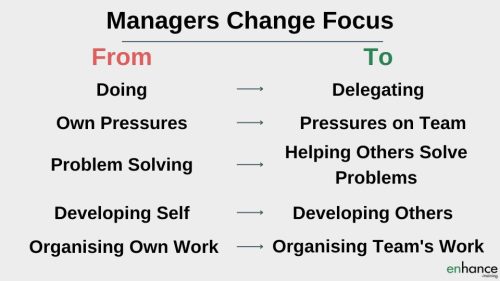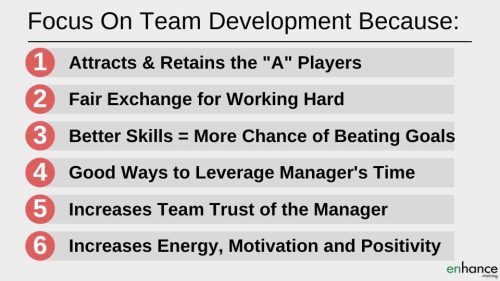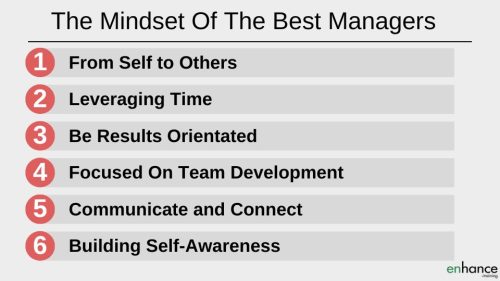The mindset of the best managers

The mindset of the best managers is the starting point in how they create success, in how they motivate their team, in how they gain such admiration and respect for what they do and what they deliver.
Learning the mindset of great managers is the result of a journey of trying different management styles and approaches before finding the combination that works while remaining authentic to themselves.
A manager’s mindset is huge in determining how do managers create value. Your mindset will influence your behaviours, actions, and decisions. Have the wrong mindset and you won’t implement the many behaviours and actions that numerous studies have proven create a positive team environment, that provide the right direction and support for your teams, so they are able to do the best job they are able.
The Mindset of the Best Managers
- From Self to Others
- Leveraging Time
- Be Results Orientated
- Focused on Team Development
- Communicate and connect
- Building self-awareness
Watch On YouTube
Listen on Podcast
A great management mindset and their corresponding behaviours are learnt. You can cut out a lot of learning time and move straight into adopting proven mindsets and behaviours and making them your own.
Understand and adopt a great management mindset, and your actions, behaviours, and skills will all be focused on getting the best from those you manage. Get the best from the team and best team results will follow. Adopt a great management mindset and you will be way ahead of many managers and well on your way to having a very successful management career.
For each mindset I will take you through what great managers do and why adopting the mindset of a great manager is so vital in getting the best from your team.
If you are serious about having a career in management, I don’t think you can afford miss learning and understanding the principles of the best managers.

From Self to Others – The first mindset of a great manager
As a team contributor it was all about yourself – working hard, learning great skills and delivering great results. The approach of focusing on what you were delivering got you into the management ranks. Then as a manager, to be successful you have to let go of that focus on yourself.
This is hard because of the behaviours that created success and because of the time and effort invested to get to this point in your career.
Managers deliver through others
The job of a manager is to get the best from their team as a whole, so the focus must be about the team. Questions you have to start asking include:
- What is best for the team?
- How do I get more from each individual and from the overall team?
- What is blocking team success at the moment?
- How can I overcome this with the help of the team?
- What am I doing that hinders the team doing their best?
Your success as a manager is now judged on the success of your team.
Many managers try to improve team success by working really hard as a contributor i.e. doing more of what used to be successful for you. This might help if you have 2-3 people in your team, but what happens if you manage 20. Working harder as a contributor will no longer work.
As a manager, everything you do should be focused on how to encourage the best from others.
You move from doing to delegating, from managing your own pressures to helping manage the pressure on others, to helping develop skills in team members so they can work smarter etc.
The focus becomes of providing direction, on creating a really positive environment and supporting others be successful. The success of your team makes you successful as a manager.

Leveraging Time – mindsets that make the best managers
There are only so many hours and minutes in every day. This is fixed for you and for your team. What is not fixed is how you and your team use the time available.
The mindset of the best managers is all about how to I make the best use of my time and more importantly, how do I make the best use of my team’s time.
An important example of the behaviour of great managers is focusing on removing problems and barriers to the team doing great work.
If a team member’s behaviour and attitude is reducing everyone’s output by 10%. Because they spend time dealing with the issues caused by that person, then replacing that person will be a great use of the manager’s time. It will also increase everyone’s output by 10%. A potentially huge gain across the team for the manager’s time spent.
Another practical example is deciding what projects, tasks and activities to spend team time on. A great manager will focus the team of what contributes most to achieving team goals. For all the tasks and requests that don’t contribute much, the manager will negotiate with stakeholders so the team can avoid doing them. Another great use of manager time.
Leverage your time and leverage the team’s time by removing as many barriers to great work as possible.

Results Orientated – a key mindset of the best managers
Businesses need to deliver great outcomes for their customers to be successful. There will be many components involved in delivering great outcomes and each team needs to do their part – sales, marketing, operations, customer services, finance, etc.
Your team needs to deliver results – for example in terms of sales, lead generation, products or service delivery, or ensuring activity is turned into profits and cash.
In results orientated teams, the goals to achieve are clear, on display and talked about regularly. There is a lot of visibility and measurement of progress towards those goals, so everyone knows exactly where they and the team stands.
The best managers know that there are many ways to reach goals and will consider all viable routes, often with team members. Then they choose and focus on the solution that best meets the constraints the team is under while delivering the most progress towards goals.
Great managers move from agenda doers to agenda setters. They focus the team on what is best to achieve results in the short term and the long term. They protect the team from the noise and distractions in the wider business.
Managers that consistently beat targets focus a lot of their energy on making sure the skills and strengths of their team members are used to the maximum.
The best managers always focus their teams on results.
Focused on Team Development – A mindset of All good managers
What’s in the mindset of a great manager is always “How do I get more from my team?” Maximising what the team currently capable of delivering is one answer. Another answer is to increase the capability of the team so they can deliver more.
Focusing on team development is a key mindset of the best managers because:
- Good development attracts and retains the A Players who are key to team performance
- Development is motivational to offer in exchange for working hard and improving skills
- Better skills and behaviours will increase the chance of the team beating targets
- Skills development is a good way to leverage manager time
- Providing development increases team trust of the manager
- Creating a learning environment increases energy, motivation and positivity within the team
I personally don’t think as a manager you can afford not to work at developing your team. Actively and visibly developing your team has so many benefits to the team as a whole and to you personally.
You don’t need a budget to develop team members – just the will, some thinking and organising and time investment. Development helps provide a fair exchange for the team members to work hard and deliver great results.
Investing time in developing others is also a personal statement that you care about them as people and their professional careers.
Can you really afford not to commit to developing your team members?

The fifth mindset of the best managers to cover is to
Communicate and connect
Management is about getting the best out of people. To have even an okay chance of achieving this, your communication with each team member needs to be good, positive, and well received.
Half of communicating is listening. Good people management is not about ordering others about and making yourself feel important.
The best managers use influencing and persuading skills far more than telling others what to do. To influence and persuade, knowing what the other person wants and prefers is pretty important. If you don’t ask questions, listen a lot and take in what you are being told, influencing and persuading is very hard.
Perhaps this is why too many managers tell their staff what to do too often which is demotivating and reduces the benefits of employing bright talented individuals.
Make the time to understand your team. Learn about each team member’s capabilities, strengths and weaknesses. Understand their desires and ambitions. Then you can communicate, persuade, and influence a lot more easily and effectively.
A great manager is also the glue that holds the team together, directing traffic, connecting problems with solutions, and helping team members connect with each other. The manager is in a brilliant position to encourage team working, sharing of ideas and solutions directly between team members rather than through the manager. Being a facilitator rather than a gate keeper of connections speeds up work and grows a strong team.
Good for the team and the manager!
The sixth mindset of the best managers is building self-awareness
Simply, how can you manage others effectively if you are not able to manage yourself. The best managers always have a positive mindset. They look for the positive in everything, even when people are being very negative. Great managers share their positivity while remaining firmly realistic. Of course managers have negative emotions but these are shared carefully and in a considered way.
All good managers know that their behaviours, decisions and actions influence their team members. If you act positively, the team will start thinking from a positive position. Your attitude influences the team directly.
Controlling your emotions in an authentic way starts with building self-awareness. If you don’t understand and recognise what gets you angry, annoyed and frustrated, then how will you channel these negative emotions into positive action that helps the team move towards their goals?
How will you keep calm during a heated and emotional outburst from a team member if you don’t recognise and manage your own hot buttons.
Understanding and awareness is the first step to gaining conscious control of our emotions. The mindset of the best managers starts with building self-awareness.
In Summary
Great management starts with your mindset and attitude. If this is wrong, negative or focused on yourself, then managing others will be a lot harder and much more likely to be unsuccessful.
It is hard to control people. We are not robots. We think and feel and chances are you have hired most of your team because they can think and solve problems. If you don’t allow your team to think, solve problems and operate independently from you, you waste a huge amount of talent and resources available to you and the business to achieve desired results.
The mindset of the best managers is focused on getting the best from each team member and from the team as a whole.
Adopt the mindsets we have covered, and you will progress much further in your management career much faster. As a recap:

I think that having the right mindset and approach as a manager is critical if you want to get the best from those you manage. All the skills and techniques won’t help if you are focused on yourself and what you are going to get from your work. Personal success follows from getting the best from your team.
Those that create the most value for the business usually have the most personal satisfaction, enjoyment, admiration and all the other things that come from doing their jobs really well.
Enjoy helping your team members be the best they can be.







